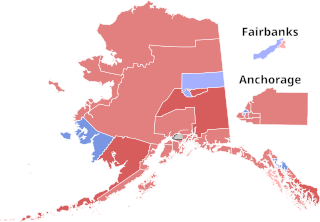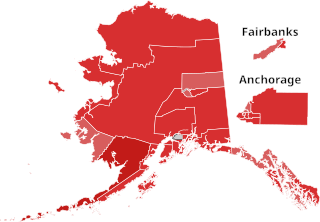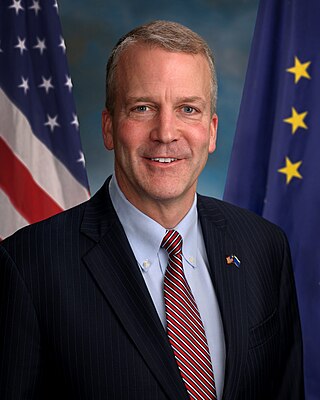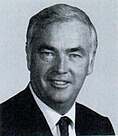
Frank Hughes Murkowski is an American politician. A member of the Republican Party, he served as a United States Senator representing Alaska from 1981 to 2002 and as the eighth governor of Alaska from 2002 to 2006.

The 1986 United States Senate elections were elections for the United States Senate. Held on November 4, in the middle of Ronald Reagan's second presidential term, the 34 seats of Class 3 were contested in regular elections. The Republicans had to defend an unusually large number of freshman Senate incumbents who had been elected on President Ronald Reagan's coattails in 1980. Democrats won a net of eight seats, defeating seven freshman incumbents, picking up two Republican-held open seats, and regaining control of the Senate for the first time since January 1981. This remains the most recent midterm election in which the sitting president's party suffered net losses while still flipping a Senate seat.

The 2006 Alaska gubernatorial general election took place on November 7, 2006. The former mayor of Wasilla, Sarah Palin, defeated incumbent governor Frank Murkowski in the Republican primary, and then went on to defeat former governor Tony Knowles in the general election. Palin became the first governor of the state to be born after Alaskan statehood.

The 1980 United States Senate election in Alaska was held on November 4, 1980. Incumbent Democratic United States Senator Mike Gravel ran for a third term in the United States Senate, but lost in the Democratic primary to Clark Gruening, a former state representative who was the grandson of Ernest Gruening, whom Gravel had defeated twelve years prior in an election for the same seat. Gruening later went on to lose the general election to Republican nominee Frank Murkowski, a banker.

The 2002 United States Senate election in Alaska was held on November 5, 2002. Incumbent Republican United States Senator Ted Stevens ran for and won a seventh term in the United States Senate. He faced perennial candidate Frank Vondersaar, the Democratic nominee, journalist Jim Sykes, the Green Party nominee, and several other independent candidates in his bid for re-election. Ultimately, Stevens crushed his opponents to win what would be his last term in the Senate, allowing him to win the highest percentage of the vote in any of his elections.

The 2004 United States Senate election in Alaska took place on November 2, 2004, alongside other elections to the United States Senate in other states as well as elections to the United States House of Representatives, various state and local elections, and the presidential election of that year. Incumbent Republican U.S. Senator Lisa Murkowski of Anchorage, sought election to her first full term after being appointed by her father Frank Murkowski to serve out the rest of the latter's unexpired term when he resigned in December 2002 to become Governor of Alaska. Her main challenger was Democratic former governor Tony Knowles, her father's predecessor as governor. Murkowski won by a slight margin.

The 2010 United States Senate election in Alaska took place on November 2, 2010, to elect a member of the United States Senate to represent the State of Alaska, alongside 33 U.S. Senate elections in other states, elections in all states for the U.S. House of Representatives, as well as various state and local elections. The general election was preceded by primary elections which were held on August 24, 2010. Scott McAdams, the Mayor of Sitka, became the Democratic nominee; Joe Miller, an attorney and former federal magistrate, became the Republican nominee after defeating incumbent U.S. Senator Lisa Murkowski. Miller was endorsed by the Tea Party movement and former Governor Sarah Palin. Murkowski announced that despite her defeat in the primary, she would run in the general election as a write-in candidate.

The 1998 United States Senate election in Alaska was held November 3, 1998. Incumbent Republican United States Senator Frank Murkowski sought re-election to a fourth term in the United States Senate. Murkowski easily won re-election against Democratic nominee Joseph Sonneman, a perennial candidate, earning nearly 75% of the vote.

The 1996 United States Senate election in Alaska was held on November 5, 1996. Incumbent Republican United States Senator Ted Stevens ran for re-election to a sixth term in the United States Senate. Stevens faced off against Democratic nominee Theresa Obermeyer, a former member of the Anchorage School Board, and Green Party nominee Jed Whittaker, a commercial fisherman. Stevens won in a landslide.

The 1986 United States Senate election in Alaska was held on November 4, 1986. Incumbent Republican United States Senator Frank Murkowski ran for a second term in the United States Senate and was primarily opposed by Alaska Pacific University President Glenn Olds. Following a highly competitive election in 1980, Murkowski faced a legitimate opponent in Glenn Olds, and the contest was fairly close. However, in the end, Murkowski was able to defeat Olds by a slightly wider margin than he won by six years prior.

The Alaska congressional election of 1970 was held on Tuesday, November 3, 1970. The term of the state's sole Representative to the United States House of Representatives expired on January 3, 1971. Incumbent Howard Wallace Pollock retired to run for Governor of Alaska. The winning candidate would serve a two-year term from January 3, 1971, to January 3, 1973. Nick Begich defeated former Alaska Commissioner of Economic Development & Anchorage banker Frank Murkowski, by a margin of 10.2%.

The 1990 United States Senate election in Alaska was held on November 6, 1990. Incumbent Republican United States Senator Ted Stevens sought re-election to a fifth term in the United States Senate, which he won easily, besting his opponents in a landslide.

The 1984 United States Senate election in Alaska was held on November 6, 1984. Incumbent Republican Senator Ted Stevens sought re-election to a fourth term in the United States Senate. Owing to his popularity and the conservative bent of Alaska, Stevens did not face major opposition, and easily defeated former Alaska Attorney General John Havelock in the general election.

The 2016 United States Senate election in Alaska was held on November 8, 2016, to elect a member of the United States Senate to represent the State of Alaska, concurrently with the 2016 U.S. presidential election, as well as other elections to the United States Senate in other states and elections to the United States House of Representatives and various state and local elections.

The 2016 United States House of Representatives election in Alaska was held on November 8, 2016, to elect the U.S. representative from Alaska's at-large congressional district, who will represent the state of Alaska in the 114th United States Congress. The election coincided with the 2016 U.S. presidential election, as well as other elections to the House of Representatives, elections to the United States Senate and various state and local elections.

The 2020 United States Senate election in Alaska was held on November 3, 2020, to elect a member of the United States Senate to represent the State of Alaska, concurrently with the nationwide presidential election, as well as other elections to the United States Senate, elections to the United States House of Representatives and various state and local elections. Incumbent Republican Senator Dan Sullivan won re-election to a second term in office, defeating Democratic nominee Al Gross, the son of Avrum Gross, who ran as an independent candidate. John Wayne Howe, the nominee of the Alaskan Independence Party, was also on the ballot and finished a distant third.
Edgar Blatchford is an American politician, academic, and attorney, and perennial candidate who served as the Mayor of Seward, Alaska. Blatchford sought the 2016 Democratic Party nomination for United States Senate, losing the nomination in the Alaskan primary to Ray Metcalfe. Blatchford filed to run for lieutenant governor in the 2018 Democratic primary, and dropped out of the race on June 8.

The 2022 United States Senate election in Alaska was held on November 8, 2022. Incumbent Senator Lisa Murkowski won reelection to a fourth full term, defeating fellow Republican Kelly Tshibaka and Democrat Patricia Chesbro.

The 2022 Alaska gubernatorial election was held on Tuesday November 8, 2022, to elect the governor of Alaska. Incumbent Republican Governor Mike Dunleavy won re-election to a second term, becoming the first Republican governor to be re-elected to a second term since Jay Hammond in 1978 and the first governor, regardless of political affiliation, to be re-elected to a second term since Tony Knowles in 1998.

The November 2022 United States House of Representatives election in Alaska was held on Tuesday, November 8, to elect a member of the United States House of Representatives to represent the state of Alaska. Democratic incumbent Mary Peltola won reelection to a full term in office, defeating Republicans Sarah Palin and Nick Begich III and Libertarian Chris Bye in the runoff count.






















